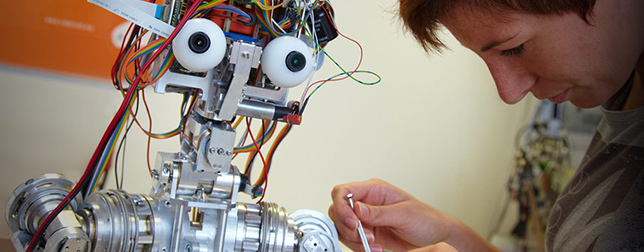The BioRobotics for Parkinson disease Laboratory is part of the BioRobotics Institute of Sant’Anna School of Advanced Studies in Pisa, Italy. The institute focuses on management, monitoring and prevention of Parkinson’s disease, and its co-morbidities, from screening for pre-frailty states (e.g. subjects with idiopathic hyposmia), to early diagnosis, rehabilitation and assistance according to the level of the pathology.
The BioRobotics for Parkinson disease Laboratory works by combining mHealth applications, Cloud technologies, cooperative ICTs, and wearable/portable integrated devices, which empower people with Parkinson’s disease to pursue healthy lifestyles and to manage their health and condition with help from their caregivers and medical staff across different care settings and environments.
Principal investigators are:
Dott. Filippo Cavallo (Email: [email protected])
Dott. Carlo Maremmani, MD PhD, Neurologist at Operative Unit of Neurology
Read more Designing Exoskeletons to Interact with Humans
About BioRobotics Institute of Sant’Anna School of Advanced Studies
The BioRobotics Institute of Sant’Anna School of Advanced Studies in Pisa, Italy aims to act as a bridge among international centers of knowledge and to create a new concept of engineers that are inventors, scientists, inventors, entrepreneurs and problem solvers.
Biorobotics is a sophisticated scientific-technological area, which merges robotics and biomedical engineering; in particular it is the science and the technology of the design and development of bioinspired robotics systems with biomedical application. While maintaining a unique vision on this topic, the research at the BioRobotics Institute is articulated in Areas and Laboratories. Research Areas are led (PI) by Professors or Associate Professors, while the Research Labs are coordinated by Assistant Professors.
Founded in 2011, the institution has built a huge knowledge database and expertise in several fields of biorobotics, such as industrial robotics, social robotics, assistive/rehabilitation/surgical robotics, cognitive systems, neural engineering, bio-inspired robots and their legal, social, ethical, and economic implications.
Read more Wearable Stomach Monitor Tracks Electrical Activity for Signs of Indigestion
“The mission of The BioRobotics Institute is educating the Engineer of the 21st Century, a competent, interdisciplinary, creative inventor and entrepreneur, able to manage new technological and scientific challenges, ready to take up new opportunities for society and industry, and acting as a linking bridge towards centres of knowledge worldwide,” says Professor Paolo Dario.
The research areas of the institute include:
- ARTIFICIAL HANDS AREA
- CREATIVE ENGINEERING DESIGN AREA
- NEURO ROBOTICS AREA
- ROBOT COMPANIONS FOR CITIZENS AREA
- SENSOR SIGNALS AND INFORMATION PROCESSING AREA
- SOFT ROBOTICS AREA
- SURGICAL ROBOTICS AND ALLIED TECHNOLOGIES AREA
- TRANSLATIONAL NEURAL ENGINEERING AREA










